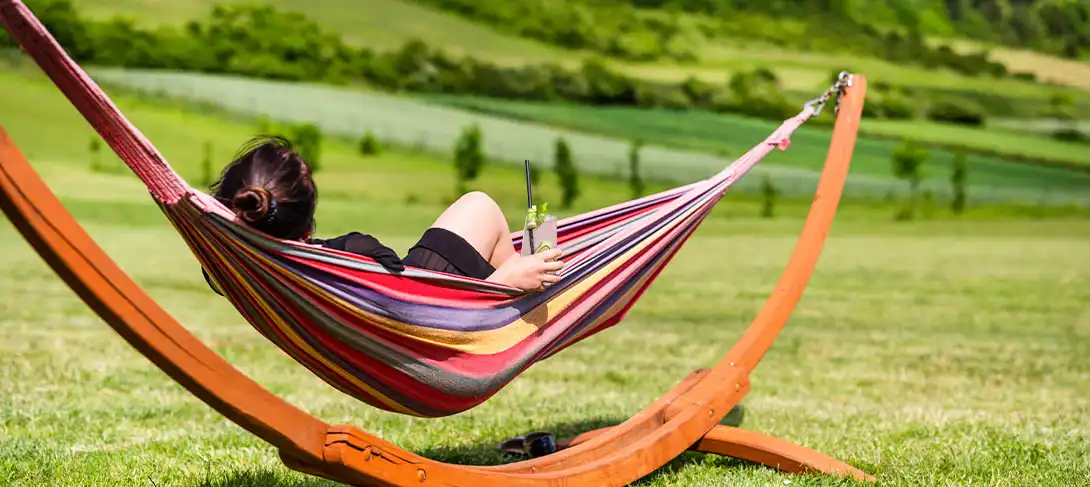Die universellen Vorteile des Nickerchens und der beste Zeitpunkt dafür
Die Forscher:innen betonen immer wieder die vielen Vorteile des Nickerchens. Es steigert die Produktivität, reduziert Stress und kann sogar das Immunsystem stärken. Nach einer schlechten Nacht fühlen wir uns oft gereizt oder emotional empfindlich. In solchen Fällen kann ein Mittagsschlaf helfen, neue Energie zu tanken, Müdigkeit zu reduzieren und die Stimmung zu heben.
Beim Nickerchen gönnen wir sowohl Körper als auch Gehirn eine Pause. Eine Studie des INSERM ergab, dass Nickerchen die kognitiven Leistungen verbessern, indem sie Konzentration und geistige Klarheit fördern. Eine Auszeit für das Gehirn hilft, neuronale Verbindungen wieder aufzubauen und unterstützt die Verarbeitung sowie Konsolidierung der tagsüber gesammelten Informationen. Kurz gesagt: Tagschlaf hilft dem Gehirn, Erinnerungen effektiver zu speichern und zu ordnen.
Ein Nickerchen kurz nach dem Mittagessen kann auch helfen, das Stressniveau zu senken. Während des Schlafes entspannt sich der Körper und das Nervensystem – oft überreizt durch den Alltag – erhält die Möglichkeit zur Erholung. Eine auf der Jahrestagung des American College of Cardiology im März 2019 vorgestellte Studie zeigte, dass Nickerchen hohen Blutdruck senken und so das Risiko für Herz-Kreislauf-Erkrankungen reduzieren können.
Produktivität ist nur einer der vielen Vorteile des Nickerchens – es fördert auch die Kreativität. Deshalb führen immer mehr Unternehmen Ruheräume am Arbeitsplatz ein.
Doch nicht jedes Nickerchen ist gleich: Kurze Nickerchen von 10 bis 20 Minuten sind ideal, um Wachheit, Konzentration und Energie zu verbessern. Unser zirkadianer Rhythmus sorgt oft am frühen Nachmittag, zwischen 14 und 15 Uhr, für ein natürliches Energietief – der perfekte Moment für ein kurzes Nickerchen. Wer zwischen 12 und 15 Uhr schläft, kann sich einen zusätzlichen Energieschub für den Rest des Tages sichern.
Um von einem Nickerchen wirklich zu profitieren, ist Komfort entscheidend. Eine hochwertige Matratze, die zum Körpertyp passt, ermöglicht optimale Entspannung. Das Mercure Bett bietet mit seiner Taschenfederkernmatratze Druckentlastung und festen Halt, während der integrierte Topper eine weiche, angenehme Schicht hinzufügt. Eine kuschelige Decke – ob mit Faser- oder Federfüllung – schenkt Wärme und Geborgenheit und erleichtert so das Einschlafen. Auch die Kissenwahl ist wichtig: Manche bevorzugen weiche oder feste Unterstützung mit Faser- oder Federfüllung, während andere zu Memory-Foam-Kissen greifen, die sich perfekt an Kopf- und Nackenform anpassen. Die Mercure-Bettwaren kombinieren all diese Elemente und bringen so das Hotelerlebnis nach Hause – jedes Nickerchen wird zu einem echten Moment der Regeneration.
Nickerchen in asiatischen Ländern
In Asien, und besonders in China, hat das Nickerchen einen festen Stellenwert. Seit 1948 ist es sogar in der Verfassung (Artikel 43) verankert und garantiert den Arbeitnehmer:innen ein Recht auf Ruhe. Diese Praxis steht im Einklang mit den Prinzipien von Yin und Yang, die Gleichgewicht und Harmonie wiederherstellen. Die spezifischen Vorteile dieses Mittagsschläfchens umfassen eine bessere Verdauung und Linderung von Magen-Darm-Beschwerden, eine schnellere Erholung nach der morgendlichen Arbeit sowie einen Energieschub, der die Produktivität am Nachmittag steigert. Es hilft auch, den zirkadianen Rhythmus zu regulieren und übermäßige Müdigkeit am späten Vormittag zu verhindern.
Auch in Japan ist das Nickerchen tief in der Arbeitskultur verwurzelt. Inemuri, was schlafen, während man anwesend ist bedeutet, wird weitgehend akzeptiert – selbst während Besprechungen – und spiegelt die Hingabe der Angestellten an ihre Arbeit wider. Zu den Vorteilen von Inemuri gehören eine sofortige Reduzierung des durch lange Arbeitszeiten verursachten Stresses, die Aufrechterhaltung der Wachsamkeit ohne Unterbrechung des Arbeitstages sowie eine Verbesserung der Konzentration und des Kurzzeitgedächtnisses. Außerdem signalisiert es sozial die Ernsthaftigkeit und das Engagement eines Mitarbeiters, indem es ihm eine kurze Erholung ermöglicht, um leistungsfähiger zu sein und chronischer Ermüdung vorzubeugen.
Nickerchen in spanischsprachigen Ländern
In den spanischsprachigen Ländern ist der Mittagsschlaf heilig. In Ländern wie Spanien oder Mexiko, in denen die große Hitze zur Mittagszeit körperliche und geistige Aktivitäten erschwert, ist eine Pause daher unverzichtbar. Man nennt sie „la siesta“. Die Mittagspause dauert in Spanien zwischen zwei und drei Stunden – im Vergleich zu durchschnittlich 45 Minuten in anderen europäischen Ländern – und lässt den Beschäftigten genügend Zeit für einen erholsamen Schlaf.
Und diese Ruhepause bietet zahlreiche Vorteile, insbesondere wenn das Nickerchen zwischen 60 und 90 Minuten dauert. Diese Art von Nickerchen ermöglicht es, in den Tiefschlaf zu gelangen, eine Phase, die für die körperliche Erholung unerlässlich ist: Sie stellt den Körper wieder her, stärkt das Immunsystem, fördert die Zellreparatur und reduziert die angesammelte Müdigkeit. Durch den Abschluss eines vollständigen Zyklus, der sowohl Tiefschlaf als auch REM-Schlaf umfasst, werden zudem Lernen, Kreativität und Gedächtniskonsolidierung verbessert.
Und wie wäre es, wenn auch Sie – sofern Sie mittags die Möglichkeit haben, nach Hause zu gehen – sich nach dem Essen eine kleine Siesta gönnen, auf einem ebenso bequemen Bett wie dem Mercure-Bett?
Nickerchen in angelsächsischen Ländern
In Ländern wie Großbritannien ist ein Nickerchen am Arbeitsplatz noch schwer vorstellbar. Angestellte im angelsächsischen Raum legen eher Wert auf einen langen, ununterbrochenen Nachtschlaf.
In den Vereinigten Staaten ist der Mittagsschlaf noch wenig verbreitet, gewinnt jedoch in einigen beruflichen Umfeldern zunehmend an Interesse. Im Silicon Valley beispielsweise lassen sich viele innovative Unternehmen von verschiedenen Kulturen inspirieren und richten Ruhezonen ein, um das Wohlbefinden ihrer Teams zu fördern. Diese Initiativen, die besonders von internationalen Fachkräften geschätzt werden, tragen dazu bei, ein ausgewogeneres und inklusiveres Arbeitsumfeld zu schaffen.
Schon ein kurzes Nickerchen von 10 bis 30 Minuten nach dem Mittagessen kann echte Vorteile bringen: Es hilft, Energie und Konzentration wiederherzustellen, Stress zu reduzieren und das Kurzzeitgedächtnis zu verbessern, sodass man für den Rest des Tages wach und aufmerksam bleibt.
Da es im Alltag so wenige Gelegenheiten für ein Nickerchen gibt, ist es umso wichtiger, das Zuhause mit hochwertigen Mercure-Bettwaren auszustatten.
Nickerchen in Europa (Deutschland, skandinavische Länder)
In nordischen Ländern wie Schweden, Norwegen und Dänemark ist das Nickerchen im Freien eine fest verankerte Tradition – insbesondere für Babys und Kleinkinder. Befürworter:innen sind überzeugt, dass dies die Gesundheit stärkt, das Immunsystem kräftigt und die Schlafqualität verbessert. Im Freien zu schlafen erhöht zudem die natürliche Lichteinstrahlung, was hilft, den zirkadianen Rhythmus zu regulieren und einen ausgeglicheneren Wachzustand über den ganzen Tag hinweg zu fördern. Außerdem regt die frische Luft die Durchblutung an und kann zu einer besseren Sauerstoffversorgung des Körpers beitragen, während sie Stress reduziert und die Stimmung verbessert.
Laut einer Studie der Universität Lappland sind Kinder, die an diese Outdoor-Nickerchen gewöhnt sind, weniger anfällig für Atemwegserkrankungen und widerstandsfähiger gegen saisonale Infekte.
In Deutschland hingegen ist das Nickerchen noch eher unüblich. In den letzten Jahren gewinnt die Idee jedoch an Popularität, und große Unternehmen beginnen, ihren Mitarbeitenden Ruheräume bereitzustellen.
In den verschiedenen Kulturen unterschiedlich verankert, bleibt das Nickerchen ein echter Verbündeter für Gesundheit und Wohlbefinden. Ob tief verwurzelt in asiatischen und hispanischen Traditionen oder neu aufkommend in modernen Arbeitswelten – seine Vorteile für Konzentration und Stressabbau sind unbestreitbar. Warum sich also nicht diese erholsame Pause gönnen, die die Produktivität steigert?
Mit der richtigen Umgebung kann selbst ein kurzes Nickerchen auf unserem Mercure-Hotelbett Ihren Tag verwandeln.

